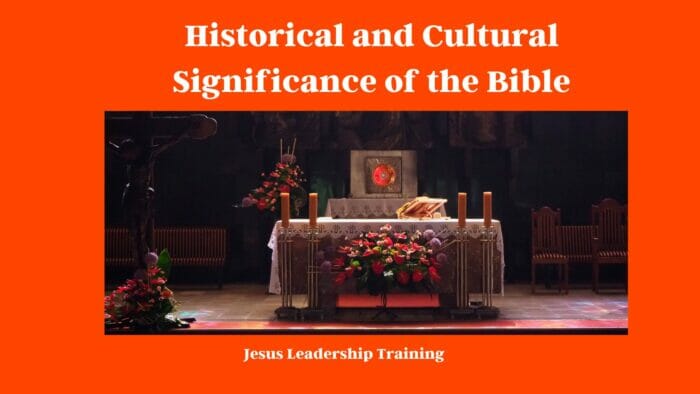Table of Contents
The Historical Context of the Bible
The Old Testament: Its Role in Ancient History
The Old Testament, also known as the Hebrew Bible, plays a pivotal role in ancient history. From Abraham’s epic journey to the establishment of the Kingdom of Israel, the Old Testament encapsulates a time rich with historical significance. It tells stories of leaders, prophets, and kings, offering valuable insights into ancient civilizations. But what’s the real purpose of these old stories? They reflect the origins of monotheism and the development of social norms, systems, and beliefs. They’re not just religious texts, but significant historical documents.
The New Testament: A Cornerstone of Modern History
The New Testament is the cornerstone of Christian faith, chronicling the life, teachings, and works of Jesus Christ and his followers. But it’s more than a religious book. From providing insights into the Roman Empire to early Christian communities, the New Testament helps us understand societal structures and practices that have shaped the world as we know it today.
The Bible as a Cultural Keystone
Western Culture and the Bible
There’s no denying the profound influence the Bible has had on Western culture. From influencing our languages – ever heard the phrase “the blind leading the blind”? That’s from the Bible – to shaping our moral and ethical perspectives, the Bible’s impact is deep-rooted and extensive. It has provided the narrative for countless works of art, literature, and music, and continues to inspire cultural expressions.

The Bible’s Influence in Eastern Cultures
In Eastern cultures, the Bible has also left a mark. While it might not be as historically rooted as in the West, its influence has grown with the spread of Christianity. Many Asian cultures have integrated Biblical stories and teachings into their social norms, laws, and artistic expressions, creating a unique blend of traditions and beliefs.
The Bible’s Effect on Literature
The Bible as a Literary Source
Think of the Bible as a gold mine of literary themes, genres, and styles. From poetry to prophecy, from genealogy to law, and from wisdom literature to apocalyptic writing, the Bible spans virtually every literary form. Great writers across the ages have drawn inspiration from this profound source, shaping the literary world.
Influences of Biblical Themes in Literature
Biblical themes like redemption, sacrifice, and faith have found their way into literature worldwide. From John Milton’s Paradise Lost to Ernest Hemingway’s The Old Man and the Sea, biblical references and themes enrich the depth and complexity of many literary works.

The Bible in Art and Music
Biblical Themes in Art
Biblical stories and characters have long provided a wealth of material for artists. From the Renaissance paintings to modern sculptures, art inspired by the Bible has left an indelible mark on humanity’s cultural heritage. Michelangelo’s Creation of Adam or Da Vinci’s The Last Supper, anyone? They’re more than just art; they’re timeless depictions of biblical narratives.
The Bible’s Impact on Music
In the realm of music, the Bible’s influence is substantial. From classical compositions like Handel’s Messiah to contemporary Christian music, biblical texts have inspired countless compositions, shaping the world of music across the ages.
The Bible’s Influence on Law and Ethics
Biblical Laws and Modern Legal Systems
Many modern legal systems have been influenced, directly or indirectly, by the Bible. The Ten Commandments, for instance, are often viewed as a precursor to many contemporary legal principles. While today’s laws have evolved significantly, the biblical influence remains, particularly in the realms of justice, equality, and moral responsibility.
Biblical Morals and Contemporary Ethics
Biblical morals have seeped into contemporary ethics too. Principles of love, kindness, justice, and integrity, central to biblical teachings, are fundamental to today’s ethical discussions, shaping societal norms, moral frameworks, and individual behaviors.

Conclusion
Understanding the historical and cultural significance of the Bible is key to understanding much of human history and cultural development. As a historical document, a cultural keystone, a literary source, an inspiration in art and music, and an ethical guide, the Bible’s influence is omnipresent, standing the test of time.
FAQs
- How has the Bible influenced modern laws? The Bible has indirectly shaped modern legal systems, especially principles of justice, equality, and moral responsibility.
- What impact has the Bible had on literature? The Bible has influenced literature in themes, genres, and styles, inspiring many famous works and authors.
- How has the Bible shaped Western and Eastern cultures? The Bible has profoundly influenced both Western and Eastern cultures, shaping languages, social norms, artistic expressions, and beliefs.
- What roles does the Bible play in art and music? The Bible has provided narratives and themes for countless works of art and musical compositions, greatly influencing these cultural expressions.
- How does the Bible contribute to historical understanding? The Old and New Testaments provide valuable insights into ancient and modern history, illuminating societal structures, practices, and beliefs that have shaped our world.



